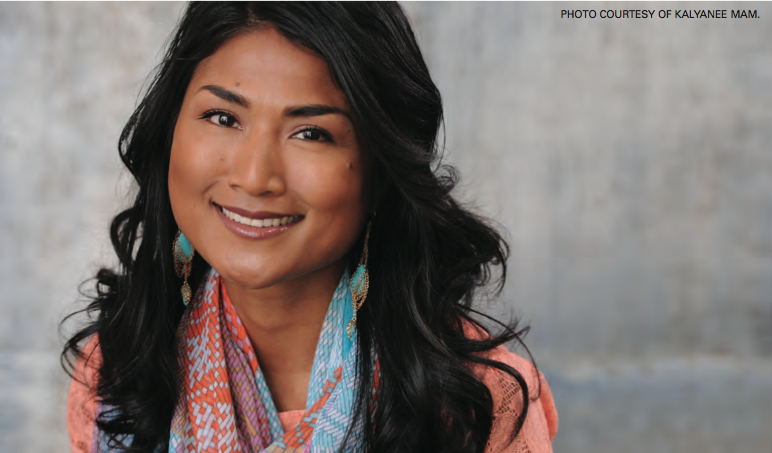Story by Kanara Ty
The Cambodian American experience has often been defined by one event – the Cambodian genocide that took place from the mid- to late-’70s, led by the Khmer Rouge. However, in recent years, there has been a cultural movement amongst 1.5- and second-generation Cambodian Americans to reconcile the past and move forward – namely, through the medium of filmmaking.
Human rights lawyer-turned-filmmaker Kalyanee Mam is one of them.
“We have been so stuck on this narrative about the Khmer Rouge,” says Mam. “It’s because it’s so exotic to people. It’s easy to sell violence, it’s easy to sell bloodshed. I think we need to take our- selves away from our past and look for- ward to the future. Our future will not be anything unless we do something about our present.”
Mam is taking up that task in her feature directorial debut, A River Changes Course, due for theatrical release in October. The award-winning documentary (it won the Grand Jury Prize for World Cinema Documentary at this year’s Sundance Film Festival) follows three individuals – Sari Math, Khieu Mok, and Sav Samourn – whose lives are impacted by some modern-day problems in Cambodia, including deforestation and overfishing due to large land and fishing concessions. While the film takes on a heavy topic, the images of Cambodia presented in the film portray a beautiful country that leave you with a heartfelt and lasting impression. The film may be activist, but the last thing on Mam’s mind is violence.
“I don’t believe in violent ways of changing things,” says Mam. “I believe in slow movements in helping raise people’s consciousness. After [audiences] watched the film, it was on their minds for weeks. The images stayed with them. The images that dig into the subconscious – those are the images that last and continue to inspire people.”
Human rights is something Mam became passionate about after her first trip to Cambodia during the summer of 1998, where she worked as a research intern at the Documentation Center of Cambodia. “The first time I went back, I completely fell in love with the country. It was like a summer romance. It was such a beautiful experience. I grew to understand the country and people more,” says the 36-year-old. “Now it’s no longer a romance. Or a young love. It’s a more mature love. I understand its weaknesses. I understand the corruption. I understand the complexities. I accept Cambodia for everything that it is.”
Initially, Mam chose law school as the vehicle to fight for human rights, but she found it frustrating. “I thought the law would aid me with the mechanisms and tools to assist people who had undergone human rights violations,” she says. “But I felt the law was not broad enough. It was so defined and so specific. There were all these boundaries, rules and regulations. People’s lives are not so restricted. People’s lives are much more complicated.”
After graduating from UCLA School of Law, Mam worked as a legal consultant for the Mozambique Ministry of Labor, as well as the Iraq Ministry of Justice. But she soon realized that she wanted to do more than just provide legal counsel for human rights victims.
“After I left Iraq, I felt like I left a part of me behind,” she says. “I was still concerned with my friends who were still there. Everyone was trying to escape the country. I was helping them legally, such as seeking asylum. I knew that wasn’t enough.” So Mam decided to make a documentary. She had been interview- ing her friend and her colleague on the down low while she was in Iraq so she had all these transcripts. She eventually turned those interviews into an award-winning documentary short, Between Earth and Sky, which focused on three Iraqi artists.
That led to work on the Academy Award-winning documentary Inside Job, which examined the global financial crisis of 2008, where Mam worked as cinematographer, associate producer, and researcher. And now with A River Changes Course, Mam is embarking on a campaign to screen the film in every single village in Cambodia, with the help from the Documentation Center of Cambodia.
“If every single person in Cambodia sees this film and sees what’s happening to [the subjects], then [they’ll realize] it’s happening to every person in Cambodia. That knowledge [would be] overwhelming,” says Mam. “It’s the first step towards raising consciousness of Cambodians living in Cambodia, and also it empowers them to do something about their situation. If everyone feels empowered to do something, you can imagine the ripple effect from that.”
This story was originally published in our Fall 2013 issue. Get your copy here.








